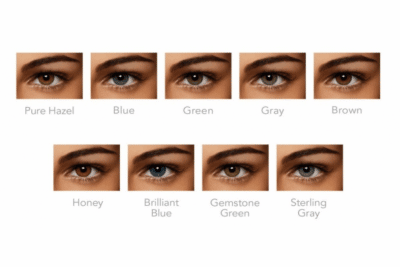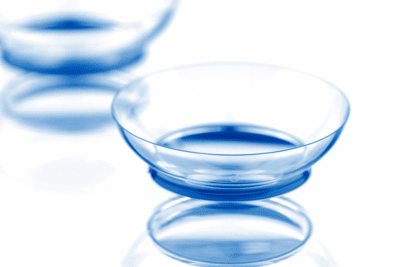
Wearing contact lenses is a great alternative to eyeglasses as it does not obstruct your field of vision. With modern technology, contact lenses have become more wearable than ever before. They are thinner, more comfortable, and longer lasting. This makes them more favourable in a variety of situations. Many people have switched to contact lenses due to mandatory mask wearing and having their glasses fog up.
Daily and Monthly Contact Lenses
Daily contacts – or daily disposables – are lenses that you wear once and then you ‘dispose’ of them. Each time you wear dailies, you open a fresh pair.
The benefit of daily disposables is that you do not need to clean or store the contacts in a case. It is also beneficial that your eyes have fresh lenses each wear. This will prevent eye infection or pain from old lenses.
Disposable contacts are very thin and contain a lot of water. This is beneficial as:
- You are providing your eyes with a lot of moisture which helps them adjust to the contact lenses.
- The contact lenses are thin, so you do not feel them sitting on the eye at all.
Disadvantage:
- Once you have taken the contact lenses out for whatever reason, you will need to dispose of it.
The other option is monthly contact lenses, which are more durable and last longer than daily contact lenses. Monthly lenses can be used for 30 days before you dispose of them. To store the contacts, you place them in a container with separate compartments with a solution.
The monthly option is more eco-friendly since you are not throwing away as many lenses. However, there is more bacteria build up in monthly’s so you need to clean the lenses thoroughly. These contact lenses use silicone hydrogel, which helps your eyes to breathe better. If your eyes have more oxygen, it improves comfort. There are various contact lens solutions to use for your contacts. It is best to follow your optometrist’s advice on which ones to use.
To make things more exciting, coloured contacts come in prescription for daily and monthly wear. Alcon have a great range of colours from hazel contacts to brilliant blue contacts. These are a good option to switch up with regular contacts.
What Factors Should You Consider When Choosing Contact Lenses?
Prescription
Depending on your eye prescription, some contact lens suppliers will not make your prescription (if it is too high) so you will have to upgrade to a different contact lens. This can become a bit trickier as you may not have as much choice if you do have a high prescription.
Your prescription will also determine whether you suit daily or monthly lenses more. For example, if you require multifocal lenses, not all companies offer dailies in that type of lens so you would need to wear monthly’s. If you have astigmatism (see blog post here) you would need to wear toric contact lenses. Sometimes it is only one eye that requires toric lenses, so you would be wearing different contact lens types in each eye.
To make sure your contact lens prescription is up to date, visit your optometrist as regularly as recommended.
Budget
You will find that there is a range of different costs when it comes to the types of contact lenses. It usually works out to be more affordable if you buy monthly contact lenses, since you are purchasing less lenses (1 pair a month compared to 30 a month). However, with monthly’s you will need to purchase lens cleaning solution and a case as well to store the contacts. There is also a different cost if your prescription is high and you require specially made lenses or multifocal lenses. This is when your private health comes in if you have that option, so you can save on some of the costs.
Lifestyle/hobbies
Depending on your requirements for wearing contact lenses, it will determine if you need daily disposable contact lenses or monthly lenses. For example, if you play a sport a few times a week and wearing glasses obstructs some of your vision or is an inconvenience, then you’d wear contacts. If that is the only reason you’ll be wearing them, then daily disposable would be recommended so you are not wasting monthly contact lenses.
If you require multifocal contact lenses, it would mean you are probably already wearing glasses 24/7 or you should be! In this case, monthly’s may be a better option since you’ll be wearing them majority of the time and you will get use out of the contacts before they expire.
Also, if you require contacts for distance vision then you would likely be wearing them most of the time as well. Monthly’s may suit you better, however it is up to the wearer to make the decision in this case depending on comfort and affordability.
Age
Daily lenses are a good option for younger people, especially those who are new to contacts. Younger wearers have a tendency of losing or tearing their contact lenses, so it is good to introduce them to dailies to begin with.
Do You Suffer From Any Other Eye Conditions?
If you suffer from dry eyes, wearing contact lenses can be a bit of a challenge as it may dry out your eyes further. This is when eye drops come into play, and it may mean having to use them frequently to assist your eyes tear film.
What Safety Tips Should You Know for Contact Lens Wear?
No matter which type of contact lenses you prefer, you must wear them properly. Eye infections usually can be prevented if you take the correct measures to clean and store your contacts. If you are unsure on how to look after your vision and contact lenses, keep reading for some tips to follow.
Always wash your hands before handling contact lenses
Bacteria from your hands can transfer to your eyes, contact lenses and lens case. If you wash and dry your hands thoroughly it will help prevent an eye infection. Make sure to change the solution in the lens case after each use.
Replace the case of your monthly contacts regularly
Even if you consistently clean your contact lens case, you still should replace them regularly. This is a precaution to prevent eye infection’s and is recommended by healthcare professionals.
Avoid wearing contact lenses while swimming or during water activities
Water contains germs which can get stuck to your contact lenses and cause eye infections. There is a severe infection called Acanthamoeba Keratitis, which can cause extreme pain and in rare cases, vision loss/blindness.
Schedule regular Eye Test’s
It is important you book an eye test at your local optometrist to keep your prescription up to date. Also to check and maintain eye health.



